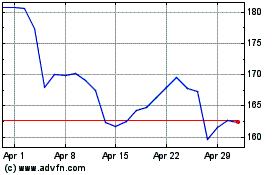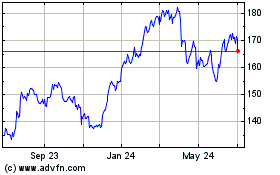By Jared S. Hopkins
Pharmaceutical companies started 2020 by raising the prices of
hundreds of drugs, according to a new analysis, though the average
increase of 5.8% was lower than a year earlier amid growing
scrutiny from patients, lawmakers and health plans.
Pfizer Inc. led the way, including increasing prices by over 9%
on more than 40 products. The drug industry traditionally sets
prices for its therapies at the start of the year and again in the
middle of the year.
More than 60 drugmakers raised prices in the U.S. on Wednesday,
according to an analysis from Rx Savings Solutions, which sells
software to help employers and health plans choose the
least-expensive medicines. The average increase was 5.8%, according
to the analysis, including increases on different doses for the
same drug.
The average is just below that of a year ago, when more than 50
companies raised the prices on hundreds of drugs by an average of
more than 6%, according to the analysis.
Pfizer said that 27% of the drugs Pfizer sells in the U.S. will
increase in price by an average of 5.6%. More than 90 of the New
York-based company's products rose in price, according to the Rx
Savings Solutions analysis. Among them are Ibrance, which sold
nearly $3.7 billion globally through the first nine months last
year, and rheumatoid arthritis therapy Xeljanz.
A Pfizer spokeswoman said that nearly half of its drugs whose
prices went up are sterile injectables, which are typically
administered in hospitals, and the majority of those increases
amount to less than $1 per product dose.
Pfizer's largest percent increases, 15%, are on its heparin
products, which are generic blood thinners typically administered
in hospitals.
Pfizer said the heparin increases are to help offset a 50%
increase in the cost of raw materials and expand capacity to meet
market demand. The company said it is monitoring the global heparin
supply, which has been challenged by the impact of African swine
flu in China, as the drug is derived from pig products and
disruption could lead to a shortage. Pfizer said that its U.S.
heparin supply is not sourced from China.
Overall, the increases by drugmakers Wednesday affect "list
prices," which are set by manufacturers, although most patients
don't pay these prices, which don't take into account rebates,
discounts and insurance payments. Drugmakers have said prices are
increased in conjunction with rebates they give to pharmacy-benefit
managers, or PBMs, in order to be placed on the lists of covered
drugs known as formularies.
In fact, drugmakers have said that their net prices have
declined because of large rebates to PBMs, which negotiate prices
in secret with their clients, such as employers and labor
unions.
Pfizer said its price increases will be offset by higher rebates
paid to insurers and middlemen. The company said the net effect on
revenue growth in 2020 will be 0%, which is the same percentage
expected for 2019. The company said the average net price of its
drugs declined by 1% in 2018.
In 2018, Pfizer was assailed by President Trump after the
company raised the prices on some 40 drugs. Pfizer temporarily
rolled back the increases, but raised prices again later.
Patients for Affordable Drugs, an organization that advocates
for policies that lower drug prices, criticized this week's
increases.
"These companies have no self control, and patients will
continue to suffer as a result, until Congress acts," said Juliana
Keeping, a spokeswoman for the group, which has received funding
from entities linked to billionaire John Arnold, a critic of
pharmaceutical industry pricing strategies.
Republicans and Democrats in Congress have drawn up proposals
for lowering drug costs, while the Trump administration recently
introduced a plan for importing drugs from Canada.
"Prices go up but demand remains the same," said Michael Rea,
CEO of Rx Savings Solutions. Clients of the Overland Park, Kan.,
company include Target Corp. and Quest Diagnostics Inc. "Without
the appropriate checks and balances in place, this is a runaway
train. Consumers, employers and health plans ultimately pay the
very steep price."
While some increases in his firm's analysis were steep, most
product prices rose by less than 9%.
AbbVie Inc. raised the price of rheumatoid arthritis treatment
Humira, the world's top-selling drug, by 7.4%, according to the
analysis. Through the first nine months of 2019, Humira sales
totaled nearly $11 billion.
AbbVie didn't respond to a request for comment.
GlaxoSmithKline PLC raised the prices on more than two dozen
different therapies, although none by more than by 5%. That
includes its shingles vaccine, Shingrix, which sold about $1.7
billion globally in the first nine months of 2019.
A Glaxo spokeswoman confirmed the increases and said net prices
for its U.S. products fell about 3.4% on average annually the past
five years.
Other major companies that raised prices included generic
drugmaker Teva Pharmaceutical Industries Ltd., which raised the
price of more than two dozen products, but none by more than 6.4%,
according to the analysis. Sanofi S.A. raised prices on some of
their therapies, but none by more than 5%, while Biogen Inc. took
increases that didn't exceed 6%, including on multiple-sclerosis
therapy Tecfidera.
A Teva spokeswoman said the company sets prices to help enable
patient access, maintain a commitment to innovation and fulfill
obligations to its stakeholders. A Sanofi spokeswoman confirmed the
increases and said that the changes are consistent with its pledge
to ensure price increases don't exceed medical inflation. A Biogen
spokesman confirmed the price changes and said adjustments are made
to products for which it continues to invest in research, and
otherwise increases follow inflation.
In addition to Pfizer's increases on heparin, companies
increased prices for several therapies by more than 10%, according
to the analysis.
Cotempla XR-ODT, which is approved in the U.S. to treat
attention-deficit hyperactivity disorder in children between 6 and
17 years old, increased by more than 13% to $420 for a month
supply. The therapy is sold by Neos Therapeutics Inc., based in
Grand Prairie, Texas.
Representatives for Neos didn't respond to requests for
comment.
Write to Jared S. Hopkins at jared.hopkins@wsj.com
(END) Dow Jones Newswires
January 02, 2020 16:11 ET (21:11 GMT)
Copyright (c) 2020 Dow Jones & Company, Inc.
AbbVie (NYSE:ABBV)
Historical Stock Chart
From Aug 2024 to Sep 2024

AbbVie (NYSE:ABBV)
Historical Stock Chart
From Sep 2023 to Sep 2024
